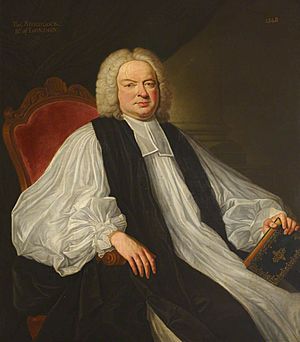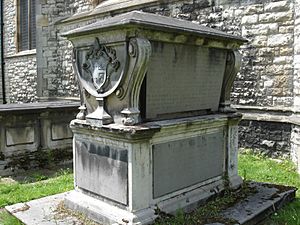Thomas Sherlock facts for kids
Quick facts for kids The Right Reverend and Right Honourable Thomas Sherlock |
|
|---|---|
| Bishop of London | |

Portrait by Jean-Baptiste van Loo
|
|
| Church | Church of England |
| Diocese | London |
| Elected | 1748 |
| Reign ended | 1761 (death) |
| Predecessor | Edmund Gibson |
| Successor | Thomas Hayter |
| Other posts | Bishop of Salisbury 1734–1748 Bishop of Bangor 1728–1734 |
| Orders | |
| Consecration | c. 1728 |
| Personal details | |
| Born | 1678 London |
| Died | 18 July 1761 |
| Buried | All Saints Church, Fulham, Middlesex |
| Nationality | British |
| Denomination | Anglican |
| Parents | William Sherlock |
| Profession | Academic |
| Alma mater | St Catharine's College, Cambridge (MA, DD) |
Thomas Sherlock (1678–18 July 1761) was an important British church leader. He was an Anglican bishop in the Church of England for 33 years. He is also known for his work in Christian apologetics, which means defending Christian beliefs.
Contents
Early Life and Education
Thomas Sherlock was born in London in 1678. His father, William Sherlock, was a very important church leader. He was the Dean of St Paul's, a high-ranking position.
Thomas went to school at Eton College. After that, he studied at St Catharine's College, Cambridge University.
In 1704, Thomas took over a special church role from his father. He became the 'Master of the Temple'. People really liked him there.
Church Career and Roles
In 1714, Thomas Sherlock became the head of his old college, St Catharine's College, Cambridge. Later, he became the Vice-Chancellor of the University of Cambridge. This meant he was in charge of the whole university for a time.
In 1715, he was made the Dean of Chichester. This was another important church position.
Sherlock was involved in a big debate called the Bangorian controversy. He argued against another church leader named Benjamin Hoadly.
In 1728, Thomas Sherlock became the Bishop of Bangor. A bishop is a senior leader in the church. He then moved to become the Bishop of Salisbury in 1734. While there, he also became the Chancellor of the Order of the Garter.
In 1748, he was promoted again to become the Bishop of London. This was a very important role. He also joined the Privy Council, which advises the King or Queen. He remained the Bishop of London until he died.
Sherlock was a good leader and got along well with different religious groups. He also helped his old school friend, Robert Walpole, who was the Prime Minister.
Important Writings

Thomas Sherlock wrote several important books and sermons. He wrote against people who doubted Christian beliefs.
One of his famous books was The Tryal of the Witnesses of the Resurrection of Jesus (1729). This book argued for the truth of Jesus's resurrection. It was very popular and had many editions.
He also wrote The Use and Intent of Prophecy in the Several Ages of the World (1725). This book was about how prophecies in the Bible were used over time.
In his later years, he published several volumes of Sermons (1754–1758). These were also highly respected. The famous writer Jane Austen even said she loved Sherlock's sermons.
Scholars believe that the philosopher David Hume might have read Sherlock's Tryal of the Witnesses. Hume then wrote his own ideas about miracles.
Sherlock also wrote a book called A Discourse Concerning the Divine Providence. In this book, he talked about God's power and care for the world.
Defending Christian Beliefs
Thomas Sherlock's arguments for the resurrection of Jesus Christ are still studied today. Modern Christian thinkers like William Lane Craig have found his work interesting.
He is known for his way of defending Christian beliefs. It is often called the "legal" or "juridical" approach. This means he used arguments similar to those used in a courtroom.
Later Life and Death
Thomas Sherlock passed away in July 1761. He was buried in the churchyard of All Saints Church, Fulham, in Middlesex.
 | Selma Burke |
 | Pauline Powell Burns |
 | Frederick J. Brown |
 | Robert Blackburn |

